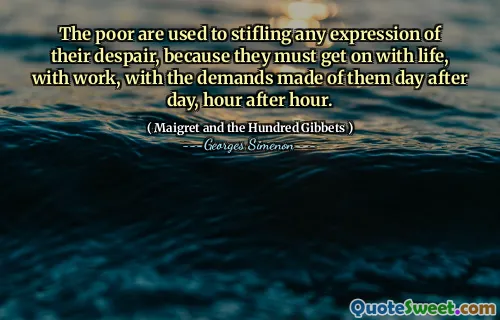
The poor are used to stifling any expression of their despair, because they must get on with life, with work, with the demands made of them day after day, hour after hour.
This quote from Georges Simenon's "Maigret and the Hundred Gibbets" poignantly captures the relentless and often invisible struggle faced by those living in poverty. It highlights a harsh reality: individuals enduring economic hardship frequently suppress their feelings of hopelessness and despair. This suppression is not a matter of choice but a necessity born out of the unyielding demands of daily survival. The cyclical nature of poverty imposes continual responsibilities and pressures—work, daily chores, societal expectations—that leave little room for emotional expression or vents for suffering.
What strikes me about this quote is the acknowledgment of a kind of forced resilience. The poor, rather than exhibiting open despair, channel their energy into persevering through adversity. This endurance, while admirable, also underscores the systemic issues that demand such sacrifices. It’s a stark reminder that the ability to express despair is often a luxury, one foregone by those with limited means who have no option but to focus on the immediate necessities.
Moreover, this quote raises important questions about society’s understanding of poverty and its demands. It draws attention to the unseen emotional and psychological toll poverty exacts—not just the economic deprivation. The idea that despair must be stifled suggests a suppression that could lead to long-term mental health consequences, which often remain unaddressed.
In reflecting upon this, I feel compelled to think about how societal structures might be improved to allow individuals not only to survive but to express and process their emotional struggles. The quote invites empathy and a deeper consideration of the human cost behind the day-to-day survival that poverty necessitates.






